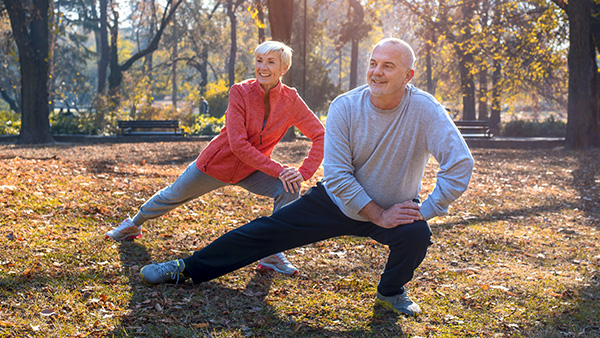“Active aging” refers to the process of staying physically, mentally, and socially active as you grow older, in order to maintain a high quality of life and overall well-being. It’s essential to tailor your approach to your individual needs and preferences while seeking guidance from healthcare professionals when necessary. Follow these tips to get you started:
- Get Regular Exercise – Staying physically active is crucial for maintaining strength, flexibility, and overall health. Aim for a mix of aerobic exercises (such as walking, swimming, or cycling), strength training, and balance exercises. Consider activities like yoga and tai chi, which can help improve flexibility and balance.
- Embrace a Healthy Diet – Focus on a diet rich in fruits, vegetables, whole grains, lean protein, and healthy fats. Stay hydrated and be mindful of portion sizes.
- Schedule Regular Health Checkups – Keep up with regular health checkups and screenings recommended by your healthcare provider. This can help catch potential health issues early and address them effectively.
- Find Mental Stimulation – Engage in activities that challenge your mind. This can include reading, puzzles, learning a new skill or language, and participating in intellectual discussions or classes.
- Establish Social Connections – Stay socially active by maintaining relationships with friends and family, joining clubs or groups that align with your interests, and participating in community activities. If you have the time try volunteering in your community, you may find you enjoy it and connect with new people.
- Learn Stress Management – Find effective ways to manage stress, such as meditation, deep breathing exercises, or mindfulness techniques. Chronic stress can have negative effects on your overall health.
- Plan for Adequate Sleep – Ensure you get enough restorative sleep each night. Poor sleep can affect your cognitive function and overall health. Create a bedtime routine that promotes good sleep hygiene.
- Practice Preventative Healthcare – Follow recommended vaccinations and preventive measures to protect against common age-related health issues, such as the flu, pneumonia, and osteoporosis.
- Be Mindful of Balance and Fall Prevention – As you age, you may become more prone to falls. Take steps to make your home safer by removing hazards and improving lighting. Additionally, consider balance exercises to reduce the risk of falls.
- Stay Informed – Keep up-to-date with the latest research and information on healthy aging. Medical and scientific advancements can provide valuable insights into how to age actively and gracefully.
- Embrace Technology – Use smartphones, tablets, and computers to stay connected with loved ones, access information and engage in online communities and activities.
- Prepare Your Finances – Ensure your financial well-being by creating a retirement plan and budget. This will help you maintain independence and security as you age.
To practice “Active Aging” you must be open to a holistic approach to healthcare that encompasses physical, mental, and social well-being. Always consult with your healthcare provider before starting a new exercise or nutrition regimen, especially if you have pre-existing health conditions. It’s never too late to get started.
Chandler Hall encourages our residents to participate in Active Aging practices offered within our campus and in the surrounding neighborhood community. Aging is a natural development process, but it does not mean you have to walk alone. Call to talk to one of our experienced professionals who would love to guide you as you navigate the Journey of Aging – 215-651-3618.
